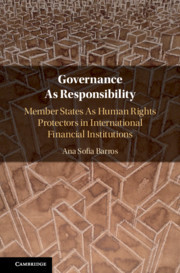Description
Governance As Responsibility
Member States As Human Rights Protectors in International Financial Institutions
Author: Barros Ana Sofia
Explores criteria determining the international responsibility of member states for failure to protect human rights in international financial institutions.
Language: English
Subject for Governance As Responsibility:
Approximative price 102.80 €
In Print (Delivery period: 14 days).
Add to cart
Publication date: 07-2019
284 p. · 15.6x23.5 cm · Hardback
284 p. · 15.6x23.5 cm · Hardback
Description
/li>Contents
/li>Biography
/li>
This book undertakes a specialised analysis of a topic that is highly significant both theoretically and practically. At the theoretical level, it discusses questions that have remained insufficiently answered in the fields of international human rights and institutional law. Notably, it clarifies how international human rights law conditions member states' governance role within international financial institutions and how this role is to be accommodated in the regime of international responsibility. Furthermore, the book's thorough discussion of member states' human rights due diligence duties offers a practical contribution to the understanding of what tools may be used by states to secure their human rights obligations when participating in international financial institutions. Its practical significance also relates to the examination of the various elements that must be demonstrated by an individual wishing to invoke member State responsibility for alleged human rights violations in the context of international financial institution operations.
Introduction; 1. The relationship between international (financial) institutions and their member states; 2. Accounting for the governance role of member states of international financial institutions in the regime of international responsibility; 3. Member states as human rights protectors in international financial institutions: matching governance with responsibility; Conclusion.
Ana Sofia Barros is a lawyer and researcher in public international law. She is currently working for the United Nations High Commissioner for Refugees. She obtained her Law degree at the University of Lisbon, a Master's degree in Human Rights and Democratisation from the European Inter-University Centre for Human Rights and Democratisation and her Ph.D. from the Catholic University of Leuven. Ana Sofia worked in a Portuguese Law Firm (CSCA), having qualified as a lawyer in 2012. She also worked as a jurist at an international NGO (IRCT) and at the European Commission (OLAF).
© 2024 LAVOISIER S.A.S.




